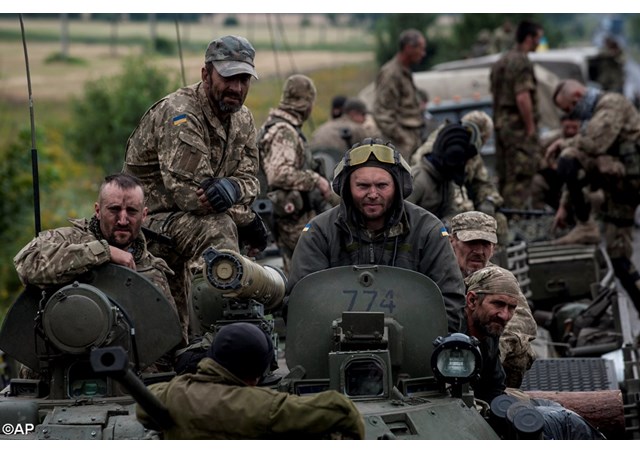
Fighting flares up in eastern Ukraine

(Vatican Radio) Ukraine has reported some of the strongest attacks by Russian backed separatists rebels since the signing of a peace deal in February, with at least eight government soldiers killed since Tuesday, while rebels claimed to have suffered three casualties on their side. The clashes come while the country prepared for the first anniversary of the downing of Malaysia Airlines flight MH17 which killed nearly 300 people, amid reports that Dutch investigators have blamed rebels for the incident.
Ukrainian military spokesman Andriy Lysenko said the situation in the conflict zone of eastern Ukraine “continues to deteriorate” adding that “the enemy has sharply increased the intensity of attacks along several parts of the frontline.”
He added that at least eight Ukrainian soldiers died since Tuesday in part because Russian-backed separatists allegedly used using heavy artillery banned under a ceasefire deal signed in Minsk, Belarus. Attacks were reportedly most intense near the frontline towns of Svitlodarsk and Horlivka and the western suburbs of the rebel-held city of Donetsk
Lysenko said three Ukrainian soldiers were killed by the shelling and five died in a landmine explosion in Luhansk region, while a further 16 were wounded. The Ukrainian Security Council stressed that rebel shelling in the past day had been among the “most powerful attacks since the signing of the Minsk agreement.”
In turn, separatists said two of their fighters and a civilian had been killed, and seven people wounded.
THOUSANDS DEAD
More than 6,500 people are believed to have been killed since the conflict broke out in eastern Ukraine in April last year. It has made it difficult to commemorate the first anniversary of the downing of Malaysia Airlines flight MH17 which killed 298 people. Media cited a leaked report in which Dutch accident investigators say that evidence points to pro-Russian rebels as being responsible for shooting down MH17.
The CNN network quoted a source as saying that a Buk missile – a Russian surface-to-air missile – was used, launched from a village in Russian rebel controlled territory. However Alexander Borodai, who was leader of the Donetsk rebel group at the time, denies wrongdoing and is indifferent to calls for a tribunal or any kind of official investigation. “I just know that it is not our fault that the plane went down. It is obvious to me that this is the result of activities on the Ukrainian side.”
On Friday the Ukrainian village of Grabovo, where most of the plane wreckage came down, plans to unveil a simple monument to honour the victims. Mayor Vladimir Berezhnoi, invited relatives he acknowledged that “the difficulties,” such as ongoing clashes in the region, will make it difficult for them to attend ceremonies.
He claims to have nightmares. “I also have feelings like every man here. I saw many deal people. I couldn't sleep. It was horrible.” And a year after the disaster on July 17, 2014, evidence of the tragedy remains. “When the wind is in the west the houses next to the crash site get it worst,” he said.
| All the contents on this site are copyrighted ©. |


